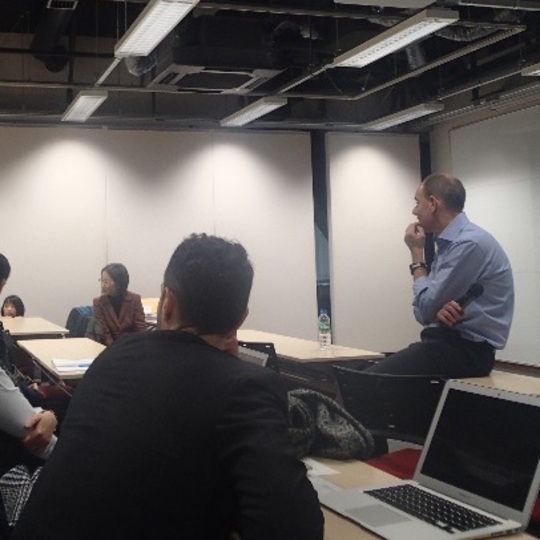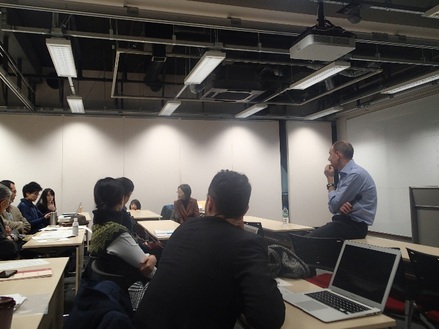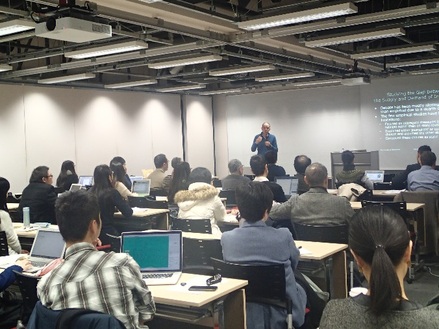
Report: The News Gap: Media Industry and Democratic Life in the 21st Century Jia Yang
- Time and Date
- January 21 (Thursday)
- Location
- Location: 92B, 9th Floor, Faculty of Engineering Bldg 2, Hongo Campus, the University of Tokyo
Currently affiliated with the Northwestern University at United States, Professor Pablo J. Boczkowski is one of the leading scholars in the field of journalism studies with special focus on the trends of digitalization in the news industry. Thanks to the efforts put forth by the "Information and Media" Unit of the IHS program, the students had a wonderful opportunity to listen to the insights of Prof. Boczkowski regarding the topic of "the news gap"--the term that indicates the difference of the information preference of the mass media and the public.
Professor Boczkowski opened his lecture with an explanation of the social and academic relevance of his latest work: The News Gap: When the Information Preference of the Media and the Public Diverge. He stated that there is a longstanding debate among journalists, as well as scholars, as to whether there is a gap between the "needs" and "wants" of an informed citizenry. While citing Robert Park's famous quotation in the 1940s, the Professor argues that the readers "want to read what is interesting" however the journalists tend to ignore this need and provide information they consider as important. This one-sided supply from the journalistic perspective may have been practical before the 1990s as the market power was high and consumers were less able to avoid the political information provided by the journalists, however, with the digitalization of the news industry it is now more feasible for the readers to choose whatever they want to read and avoid journalistic agendas. As a result, recent years exhibited a rapid expansion of the internet corporations and also a sharp decrease of traditional media companies as well as print media industry. Besides, the decreasing popularity of traditional journalism nowadays also caused an unpromising influence of the civic participation on the Western democracies.
Professor Boczkowski also argued the significance of his study from an academic perspective. According to him, the previous research was mostly focused on ideological debate rather than empirical approach. Furthermore, empirical research also has its own limitations. In general, the existing research: (1) focused on the aggregate measures rather than story-level choices; (2) examined either the journalists' or consumers' choice and assumed the news preference of the other side; and (3) considered that the gap between the choices of journalists and readers are static and without change in different periods.
With the intent to fill the above research gap, Professor Boczkowski and his colleague Eugenia Mitchelstein conducted their research to better understand the news gap in contemporary context. First, by examining the mainstream media in United States in 2007, they discovered that a gap in news--difference in the reporting and consuming preferences of the journalists and the public-- is always persistent and discernible. The consumers prefer the stories about non-public affairs while the journalists always oversupply the stories about public affairs. Secondly, with the purpose to understand whether the gap found in the States also existed in other countries, the professors replicated their research in the Western Europe and Latin American contexts. Unsurprisingly, the news gap also persisted in the examined sites of different countries. Moreover, the percentages of which kinds of news people want to know in Western Europe and Latin America were exact the same and the percentages of what kinds of news journalists supplied in both regions were also of small difference. Finally, by examining the changes of the news gap of five periods in five years, the professors found that the gap was by no means static. Instead, they found that in the year with significant political events--such as major elections--the gap between demand and supply tends to shrink.
Except for examining of the news gap from the thematic perspective, Professor Boczkowski and his colleague Mitchelstein also analyzed the gap in terms of storytelling format. As "making the hard story soft" has been a wide-discussed solution to amend the gap, the professors tried to determine whether the narrative format could change the gap. The research indicated the difference of the preference of storytelling format do exist, the gap is not as huge as the thematic one. Moreover, it seems that in terms of the story of public affairs, the consumers tend to avoid it despite of the narrative features. Hence, the professor argued that the consumers tend to avoid the public-affair stories in whatever format including the "softer" ones such as participatory forms and they enjoy the non public-affair news regardless of narrative format.
Followed by the lecture was a workshop in which the students presented their research projects and Professor Boczkowski gave comments. Since the professor is not particular familiar with the context of Asia, which is the region discussed primarily within the presentation of the students, the comments from Professor Boczkowski were mostly from a methodological standpoint. For example, he pointed out the sampling problems in one student's research by indicating the way the student chose the research sample is not representative enough and the possible biased results which might follow by this problematic methodology.
All in all, the lecture and the workshop on January 21st were both highly intriguing academically. While he didn't include social media such as Facebook or Twitter in his research, the overall research presented by the professor was very relevant to today's media context. The research also, to some extent, revealed that the current journalistic agenda, despite user-produced contents coming to force, is still dominated by the elite and not for the public. Professor Boczkowski's comment on the students' presentation were also insightful as the knowledge of methodology could be applied to most sociology research despite of the difference in topic. After participating in this event, I have a better understanding of the news industry in the United States, and I am looking forward to experiencing the American journalism practice in the following Washington D.C. study tour in the middle of March of 2016.


report date : February 05, 2016
